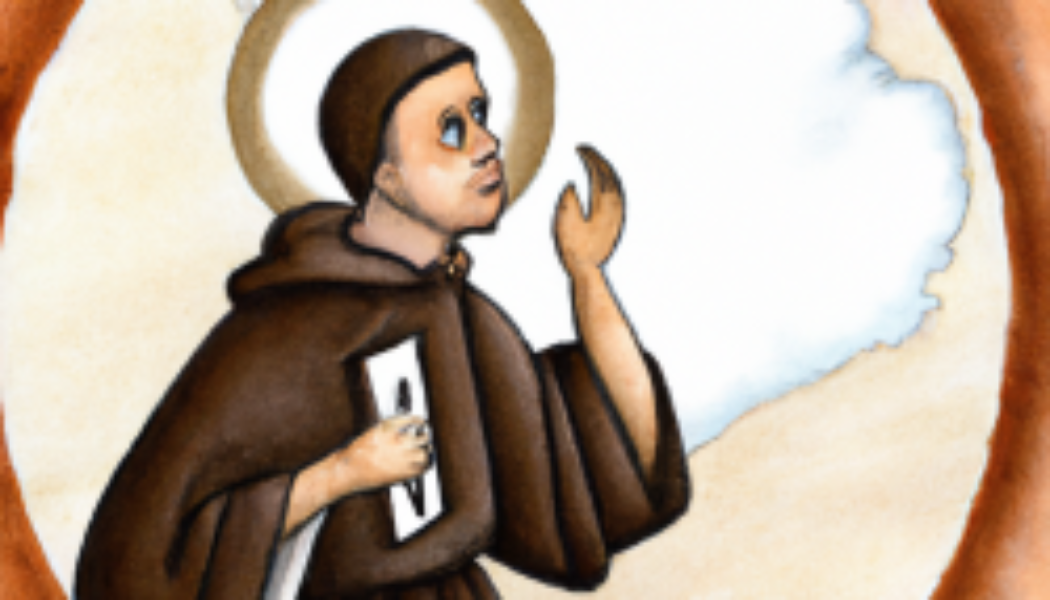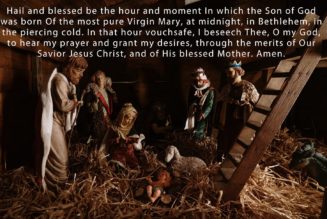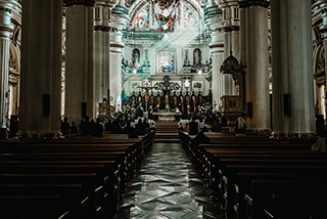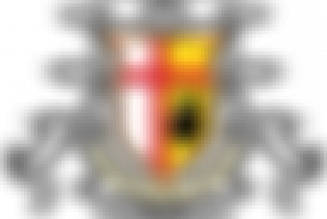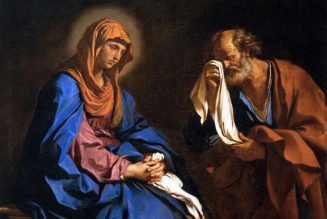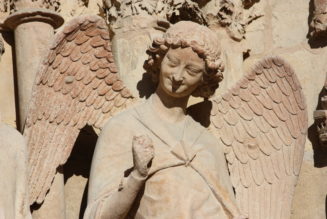20th Sunday in Ordinary Time
By Fr. Victor Feltes
We are surrounded by a great cloud of witnesses. The New Testament Letter to the Hebrews celebrates the faith and actions of Old Testament heroes: beginning with Abel, Enoch, and Noah; Abraham and Sarah; Isaac, Jacob, and Joseph; Moses and Rahab; Israel’s judges Gideon, Barak, Samson, and Jephthah; David, Samuel, and all the prophets. Then comes the passages of today’s second reading:
“Since we are surrounded by so great a cloud of witnesses, let us rid ourselves of every burden and sin that clings to us and persevere in running the race that lies before us while keeping our eyes fixed on Jesus, the leader and perfecter of faith.”
These witnesses surrounding us who can help us follow Jesus are not far away. As The Letter to the Hebrews tells us later in the same chapter:
“You have approached Mount Zion and the city of the living God, the heavenly Jerusalem, and countless angels in festal gathering, and the assembly of the firstborn enrolled in heaven, and God the judge of all, and the spirits of the just made perfect, and Jesus, the mediator of a new covenant, and the sprinkled blood that speaks more eloquently than that of Abel.”
St. Paul once wrote, “Be imitators of me, as I am of Christ.” But can the holy dead help us in more ways than merely being a good examples Indeed. First we must understand that the holy dead are still alive.
The Sadducees who questioned Jesus about the resurrection of the dead did not believe in life after death and only accepted the first five books of the Old Testament. So using only those five books (known as the Torah), Jesus proves that the dead still live. Jesus asks them: “Have you not read in the Book of Moses, in the passage about the [burning] bush, how God told him, ‘I AM the God of Abraham, the God of Isaac, and the God of Jacob’? He is not God of the dead, but of the living, for to him all are alive.”
But have the holy dead ever been of any help to the living? “Behold,” at Jesus’ Transfiguration on Mount Tabor, “two men were conversing with him, Moses and Elijah, who appeared in glory and spoke of his exodus that he was going to accomplish in Jerusalem.” Even before he opened the gates of heaven, they are aware of the nature of Jesus’ salvific mission and encourage him before he undergoes his Passion. By the will of God, Jesus was aided by the saints and they would help us too. The Book of Revelation shows saints in heaven now, before the end of the world. They express concern about events down here on earth and offer their prayers to God.
Offering prayers to the saints above goes back to the Early Church. The first centuries saw huge theological fights over things like deciding on which date to celebrate Easter or choosing the very best word in Greek to articulate a tenet about the Trinity, but the Early Church never blinked at prayers asking the intercession of the saints. If this practice had been some novel innovation alien to the Faith passed down by the apostles, it would have raised major upheaval. The presence of such prayers in the historical record and the simultaneous absence of major controversy tells us something.
Now when some non-Catholic Christians hear about us praying to saints, they assume this means we worship saints. We love and honor saints, but we worship God alone. The objectors misunderstand by equating all prayer with worship. The word “pray” is an old English word which means “to ask, or request.” This word is commonly seen in Shakespeare plays, as in “I pray thee, hold thy peace.” Praying to saints is asking them to ask God to help us.
At this point some critics counter, “Then why not simply go to Jesus? Why not just pray directly to him?” We can and we do, but I would ask these persons if they ever ask their family members or friends to pray for them and whether they consider this a good and worthwhile thing to do. Scripture indeed teaches us to “pray for one another,” noting that “the fervent prayer of a righteous person is very powerful.” If you’re going to ask anyone to pray for you, who better than a holy saint in Heaven?
In preparing for this homily, it occurred to me to look up the saint for today to use as an illustration of what we can learn from them and how they can help us. I typed into my search engine: “August 13 feast day” and information about St. Anthony of Padua popped up. This was both a outstanding and peculiar result; outstanding because he’s a great and fascinating saint, peculiar because his feast day is not August 13th but June 13th. I took this as a sign that acquaintance with St. Anthony is meant to be more widely shared today.
 St. Anthony of Padua was born in Portugal in 1095. Though from a prominent family, he entered religious order at the age of fifteen. He sought to become a martyr by preaching Christ in Muslim lands, and eventually received his superiors’ permission to do so, but illness prevented his journey. He then tried to live quiet life of prayer and penance as a hermit, but God again had other plans for him. When asked to give a short sermon during a meal held for Dominicans and Franciscans following an ordination Mass, Anthony’s previously unknown brilliance shined through.
St. Anthony of Padua was born in Portugal in 1095. Though from a prominent family, he entered religious order at the age of fifteen. He sought to become a martyr by preaching Christ in Muslim lands, and eventually received his superiors’ permission to do so, but illness prevented his journey. He then tried to live quiet life of prayer and penance as a hermit, but God again had other plans for him. When asked to give a short sermon during a meal held for Dominicans and Franciscans following an ordination Mass, Anthony’s previously unknown brilliance shined through.
Anthony was reportedly “gifted with a prodigious memory, so that he retained all he read, and could have it ready at hand whenever needed.” St. Thomas Aquinas is also said to have had a memory like that, having written his book “The Golden Chain” (a collection of the Church Fathers’ commentary on each chapter of the Gospels) from memory. These anecdotes are plausible to me because I personally know a cardinal who could have met you once years before and at your next meeting would remember your face, your name, where you had met, and what you talked about. Though you and I lack this incredible gift, there is an encouragement for us in it. If natural human brains in this fallen world can sometimes possess this amazing ability, then our minds in glorified bodies will be capable of the same and more one day.
St. Anthony met and befriended St. Francis of Assisi, who sent him forth to be a traveling preacher. His preaching drew crowds so large that the churches could not hold all of the people. One of the things I love about saints’ stories is learning about how they handled difficulties, be they personal, interpersonal, or practical problems. For instance, how does one preach to a crowd of 30,000 gathered in an open field in the time before electricity? St. Anthony would stand and speak from a raised platform in the center, then brothers posted at increasing distances around him would repeat his message, phrase by phrase, to the crowd.
Like many other saints, we can read St. Anthony’s wisdom online for free. Some quotes from St. Anthony include: “Actions speak louder than words; let your words teach and your actions speak.” He said, “Earthly riches are like the reed. Its roots are sunk in the swamp, and its exterior is fair to behold; but inside it is hollow. If a man leans on such a reed, it will snap off and pierce his soul.” And, “Attribute to God every good that you have received. If you take credit for something that does not belong to you, you will be guilty of theft.”
St. Anthony was once a victim of theft. One of the monks ran away from his monastery and took with him one of Anthony’s books. In those days before the printing press, books could be very pricey and might be resold for fast cash. This particular book was dear to St. Anthony so he prayed it might return. His prayer was answered when the runaway brother had a change of heart, returned to the community, and repentantly gave back the book. This story is the reason why St. Anthony is the patron saint of lost items.
His intercession in finding lost items is powerful. I encourage small children be taught to say this delightful prayer while spinning: “Tony, Tony, come around, help what’s lost to soon be found.” (Of course, adults may choose different words and omit the action entirely if they prefer). This February, during the process of selling St. Jude’s Church, I realized that the key to the church I needed for a meeting in New Auburn that same hour was missing. I checked all over my rectory’s floors, tables, and countertops. It occurred to me I might have lost it amongst the dirty laundry, so I took my hamper down to the laundry room. Before searching my fresh, clean clothes I began checking my dirty clothes’ pockets. Then I thought, ‘I should pray for St. Anthony of Padua’s help.’ At the very moment I began to speak to him, my hand touched the key in a pants pocket. It was surreal and I felt very, very grateful.
Like the story I told at yesterday’s funeral, as Anthony lay dying (at the age of 35 from an illness) he had a vision of a heavenly visitor. One of the friars asked Anthony what he was staring at so intently. He replied, “I see my Lord!” Saints’ stories also contain weird and wonderful miracles, which show that there is more to reality than the world we see. When Anthony’s tomb was opened thirteen years after his passing, his body had naturally decayed to dusty bones, but his motionless tongue—which had proclaimed Jesus Christ so well—appeared healthy, moistened, and alive.
Are you called to be a European religious brother, priest, and Doctor of the Church like St. Anthony of Padua? Almost certainly not. Nor are you called to be an celibate Middle Eastern carpenter like Jesus Christ. But the saints show us powerful and beautiful reflections of Christ, different ways of being like our Lord, in every age and walk of life.
I hope that you will get closer to St. Anthony and the many friends we have in heaven. Ask God to introduce you, learn about them and befriend them. By the time you discover a new saint, he or she knows and loves you already, for the knowledge and love possessed by the saints in glory partakes of the wisdom and love of God.
Join Our Telegram Group : Salvation & Prosperity
